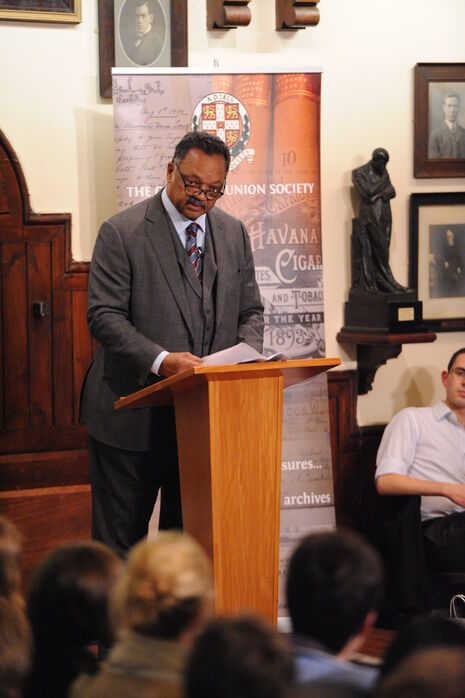“I don’t want to be blind in order to see”: Jesse Jackson in Cambridge
Revd Jesse Jackson, a leading figure of the civil rights movement, visited the Cambridge Union yesterday

One could be forgiven for thinking the grand old age of 72 to be ample excuse to sit back and slow down. Not so for the Reverend Jesse Jackson, who continued his speaking arrangements tour around the UK at the Cambridge Union last night.
A famous commentator, it may nevertheless be surprising to know that Jackson has Oxbridge in his sights. After asking those present in the chamber who had been privately educated to raise their hands, he called upon everyone there to “use their world class education to make the world better off” and expressed his disgust and dismay at the fact that 21 Oxbridge colleges took no black students last year.
Urging the audience to demand more black classmates and teachers, he cried out against the dangers of a “good vertical education without a horizontal base” and encouraged students instead to look up and out.
Although Jackson is best known for his racial policies, he is also an advocate of the poor and spoke out in condemnation both of Black Friday (the Friday after Thanksgiving – the biggest shopping day of the year in the United States), saying “they need a rope, not a shovel to dig deeper” and of the American bailout: “we bailed out banks but not the victims of their misbehaviours” and criticising banks for their reluctance to give loans.
Jackson is keen to acknowledge the developments of the last 50 years, rejoicing over an end to apartheid in South Africa and universal suffrage in the USA. However, he remains angry about the gap between the rich and poor both in American society and worldwide: “the rich are getting richer faster and the poor are expanding”.
Looking further afield, Reverend Jackson was positive about developments in Africa, noting with pleasure that 7 of the 10 fastest growing world economies are in sub-Saharan Africa. He did, however, condemn military intervention in Iraq, and was particularly scathing about the description of the deaths of civilians as “collateral damage”. He also blamed the money that went into the war in Iraq in part for the global financial collapse.
Jackson was keen to reiterate his support for the Patient Protection and Affordable Care Act (commonly known as ‘Obamacare’), which bears some similarities to the system of Universal Healthcare which formed a part of his 1988 bid for the Democratic Party Presidential Nomination. He wryly joked that “they want affordable healthcare but not Obamacare. That’s like wanting an omelette without an egg”.
Jackson’s anger against the pervasive racial inequality of American society has not abated, though his fight against it has been long. Upon being asked what it was that drove him onwards despite so many setbacks he replied: “You win sometimes, you lose sometimes [but] you cannot let racism stop you from getting up in the morning…When you’re fighting racial or gender inequality, you never have a tailwind.”
The next debate at the Union Society centres on the motion “This House Would Ban Affirmative Action”. Jackson is a famous advocate of such programmes and defended his views when questioned on them. He spoke of the need to offset years of the marginalization of minorities, and said that it was sometimes necessary for academic institutions to make “some adjustments” in regards to who and what they are looking for. Jackson fully acknowledges racial differences. One spectator asked him if he thought we would ever see a world that was truly colourblind. Jackson responded: “I don’t want to be blind in order to see”. His vision is of a world which is not colourblind and homogenous but rather “colour caring”. That proved an attractive notion last night.
 News / Right-wing billionaire Peter Thiel gives ‘antichrist’ lecture in Cambridge6 February 2026
News / Right-wing billionaire Peter Thiel gives ‘antichrist’ lecture in Cambridge6 February 2026 News / John’s duped into £10m overspend6 February 2026
News / John’s duped into £10m overspend6 February 2026 News / Epstein contacted Cambridge academics about research funding6 February 2026
News / Epstein contacted Cambridge academics about research funding6 February 2026 News / Man pleads guility to arson at Catz8 February 2026
News / Man pleads guility to arson at Catz8 February 2026 News / Corpus FemSoc no longer named after man6 February 2026
News / Corpus FemSoc no longer named after man6 February 2026








